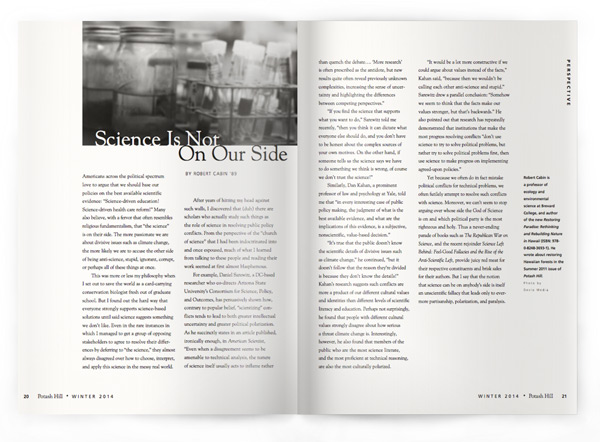Science is Not On Our Side

Perspective
By Robert Cabin ’89
 Americans across the political spectrum
love to argue that we should base our policies on the best available scientific evidence: “Science-driven education! Science-driven health care reform!” Many
also believe, with a fervor that often resembles religious fundamentalism, that “the science”
is on their side. The more passionate we are about divisive issues such as climate change, the more likely we are to accuse the other side of being anti-science, stupid, ignorant, corrupt, or perhaps all of these things at once.
Americans across the political spectrum
love to argue that we should base our policies on the best available scientific evidence: “Science-driven education! Science-driven health care reform!” Many
also believe, with a fervor that often resembles religious fundamentalism, that “the science”
is on their side. The more passionate we are about divisive issues such as climate change, the more likely we are to accuse the other side of being anti-science, stupid, ignorant, corrupt, or perhaps all of these things at once.
This was more or less my philosophy when I set out to save the world as a card-carrying conservation biologist fresh out of graduate school. But I found out the hard way that everyone strongly supports science-based solutions until said science suggests something we don’t like. Even in the rare instances in which I managed to get a group of opposing stakeholders to agree to resolve their differences by deferring to “the science,” they almost always disagreed over how to choose, interpret, and apply this science in the messy real world.
After years of hitting my head against such walls, I discovered that (duh) there are scholars who actually study such things as the role of science in resolving public policy conflicts. From the perspective of the “church of science” that I had been indoctrinated into and once espoused, much of what I learned from talking to these people and reading their work seemed at first almost blasphemous.
For example, Daniel Sarewitz, a DC-based researcher who co-directs Arizona State University’s Consortium for Science, Policy, and Outcomes, has persuasively shown how, contrary to popular belief, “scientizing” conflicts tends to lead to both greater intellectual uncertainty and greater political polarization. As he succinctly states in an article published, ironically enough, in American Scientist, “Even when a disagreement seems to be amenable to technical analysis, the nature of science itself usually acts to inflame rather than quench the debate.... ‘More research’ is often prescribed as the antidote, but new results quite often reveal previously unknown complexities, increasing the sense of uncertainty and highlighting the differences between competing perspectives.”
“If you find the science that supports what you want to do,” Sarewitz told me recently, “then you think it can dictate what everyone else should do, and you don’t have to be honest about the complex sources of your own motives. On the other hand, if someone tells us the science says we have to do something we think is wrong, of course we don’t trust the science!”
Similarly, Dan Kahan, a prominent professor of law and psychology at Yale, told me that “in every interesting case of public policy making, the judgment of what is the best available evidence, and what are the implications of this evidence, is a subjective, nonscientific, value-based decision.”
“It’s true that the public doesn’t know the scientific details of divisive issues such as climate change,” he continued, “but it doesn’t follow that the reason they’re divided is because they don’t know the details!” Kahan’s research suggests such conflicts are more a product of our different cultural values and identities than different levels of scientific literacy and education. Perhaps not surprisingly, he found that people with different cultural values strongly disagree about how serious a threat climate change is. Interestingly, however, he also found that members of the public who are the most science literate, and the most proficient at technical reasoning, are also the most culturally polarized.
“It would be a lot more constructive if we could argue about values instead of the facts,” Kahan said, “because then we wouldn’t be calling each other anti-science and stupid.” Sarewitz drew a parallel conclusion: “Somehow we seem to think that the facts make our values stronger, but that’s backwards.” He also pointed out that research has repeatedly demonstrated that institutions that make the most progress resolving conflicts “don’t use science to try to solve political problems, but rather try to solve political problems first, then use science to make progress on implementing agreed-upon policies.”
Yet because we often do in fact mistake political conflicts for technical problems, we often futilely attempt to resolve such conflicts with science. Moreover, we can’t seem to stop arguing over whose side the God of Science is on and which political party is the most righteous and holy. Thus a never-ending parade of books such as The Republican War on Science, and the recent rejoinder Science Left Behind: Feel-Good Fallacies and the Rise of the Anti-Scientific Left, provide juicy red meat for their respective constituents and brisk sales for their authors. But I say that the notion that science can be on anybody’s side is itself an unscientific fallacy that leads only to ever-more partisanship, polarization, and paralysis.
Robert Cabin is a professor of ecology and environmental science at Brevard College, and author of the new Restoring Paradise: Rethinking and Rebuilding Nature in Hawaii (ISBN: 978- 0-8248-3693-1). He wrote about restoring Hawaiian forests in the Summer 2011 issue of Potash Hill.
Photo by devlo Media